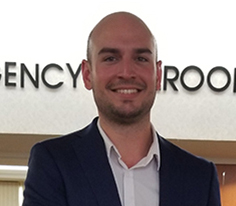Ultra-Wide Band On-Chip Circulators with Sequentially-Switched Delay Lines (SSDL)

Speaker: Mathew Biedka
Affiliation: UCLA Ph.D. Candidate
Abstract: The radio spectrum is continuing to become more and more scarce, following the increasing demands of mobile cellular networks and sensing. This has pushed many in industry and academia to search for ways to increase spectral efficiency in a world which is becoming more inter-connected with each passing minute. The ultimate achievement would be to simultaneously transmit and receive over the same frequency (STAR) using a single antenna. To do this, a circulator is used to separate transmitting and receiving signals that share the common antenna path. A circulator provides a form of traffic control for these radio signals, and is the first line of defense in isolating the transmitter from the receiver. Traditional circulators are built with nonreciprocal magnetic material, such as ferrite, which is formed into a cylindrical cavity. These circulators are bulky and are not compatible with standard semiconductor integrated circuit technologies.
This work demonstrates an on-chip circulator operating over a wide bandwidth that does not rely on ferrite material. The key idea behind Sequentially-Switched Delay Lines (SSDL) is a series of sequential switching actions that are added to the electrical signal path in a speed synchronous to that of the signal propagating on the path. As the switching actions are only synchronized with the wave propagation in one direction in the fashion of true time delay, a frequency independent non-reciprocity can be achieved, assuming there is not frequency dispersion in the signal propagation path. The first part of this presentation will cover the overview of SSDL operation along with the beginning stages of SSDL development. The second part of the talk will discuss fundamental issues facing the performance of SSDL and the strategy to overcome them. The SSDL circulator shows promise for use in full-duplex radios of the future.
Biography: Mathew received his B.E. degree in electrical engineering from Youngstown State University in 2014. He then joined the Digital Microwave (DM) Lab under the supervision of Professor Yuanxun “Ethan” Wang. He received his M.S. in electrical engineering from UCLA in 2016. Mathew’s research interests include MMIC design and RF front end system development.
For more information, contact Prof. Yuanxun “Ethan” Wang (ywang@ee.ucla.edu)
Date/Time:
Date(s) - Jun 12, 2019
2:00 pm - 4:00 pm
Location:
E-IV Tesla Room #53-125
420 Westwood Plaza - 5th Flr., Los Angeles CA 90095
